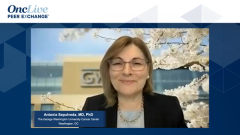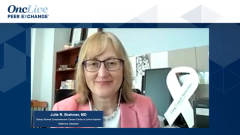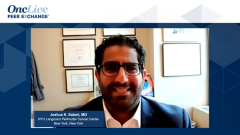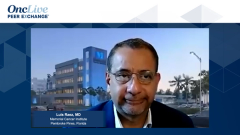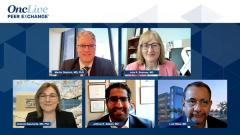
Sotorasib in the Treatment of KRAS G12C–Mutant NSCLC
Expert panelists review the CodeBreaK trials focused on sotorasib in the treatment of patients with KRAS G12C-mutant non–small cell lung cancer.
Episodes in this series

Transcript:
Martin Dietrich, MD, PhD: Let’s move on to some of the discussion surrounding KRAS. We’ve seen CodeBreaK 100 was not only an interesting phase 1/2 study moving the needle but also moving a needle in a space where there was no needle before. [It showed] a very interesting survival beyond 1 year of overall survival in this later-line patient population. It’s clearly a push forward and really instilling a lot of hope into the KRAS G12C space at least, a mutation-specific targeting agent targeting the cysteine residue of KRAS with 1 amino acid exchange mutation. But then we had a little bit of a setback with CodeBreaK 200. Dr Brahmer, maybe you can comment on this—how this would fit into your clinic paradigm, how you use it, and your overall impression of the study.
Julie R. Brahmer, MD: Depending on the day and depending on how you look at it [determines] whether it’s glass half full or glass half empty. Glass half full is awesome. We have a KRAS G12C inhibitor that does have a very good response rate of about 30%, obviously better than docetaxel, but the progression-free survival, [although] improved, was only about a month or month and a half improvement. It just wasn’t exactly the biggest home run that we hoped for, but it is something and another option for our patients to just kick that docetaxel can down the road. But I think that obviously we need more information. The adverse effects of these drugs obviously are different. You do have to deal with some liver function abnormalities, you [must] deal with some GI [gastrointestinal] toxicities, and you [must] be able to dose reduce, but a lot of patients can tolerate these therapies and it gives them another option. It’s great that we have this, but there have to be other options out there.
Martin Dietrich, MD, PhD: Dr Sepulveda, we’re talking about adverse effects. Can you share your thoughts on the results of the CodeBreaK 101 study looking at sotorasib plus immunotherapy?
Antonia Sepulveda, MD, PhD: From my perspective, I’m a molecular pathologist, but I think this is really an exciting time and it took such a long time to break the code with activated KRAS. And so, these new drugs that now are FDA approved I think really opened very exciting hope and opportunity. I was reading about the recent update on CodeBreaK 101, and what I took from it was that the combination with PD-1 inhibitors—and from my understanding [this] is in the preclinical setting—sotorasib synergized with PD-1 inhibitors, resulting in inhibition of tumor growth in mice and also histologically it was seen to be associated with the increased infiltration of CD8-positive T cells.
And now on the updates from CodeBreaK 101, the results with either pembrolizumab or atezolizumab seemed to indicate that there was some welcome positive response with an overall survival of over 15 months. And so, in my mind as a cancer biologist, this seems quite hopeful. But of course, I think this is tempered by the finding of toxicity. In particular in this study, the concern was primarily hepatotoxicity. Certainly this needs to be put in practice in a very cautious manner and managed very closely with the patients, but it seems hopeful.
Transcript is AI-generated and edited for clarity and readability.


